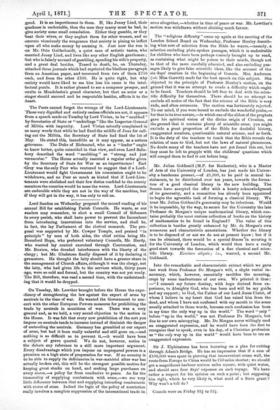On Tuesday, Mr. Lowther brought before the House the expe-
.diency of strengthening the law against the export of arms by neutrals in the time of war. He wanted the Government to con- .cert with the other European Powers measures for prohibiting the trade by neutrals in munitions of war. There was a very general and, as we hold, a very sound objection to the motion in the House. It was felt that every new prohibition of the sort you impose on neutrals tends to increase instead of diminish the danger -of embroiling the neutrals. Germany has grumbled at our export of arms, but had it been really unlawful and still gone on,—and nothing is so difficult as to prevent it,—it would have been a subject of grave quarrel. We do not, however, notice in the debate any reference to a still more important argument. Every disadvantage which you impose on unprepared powers is a premium on a high state of preparation for war. If no country is to be able to supply its deficiencies in war-materiel after war has actually broken out, this will be the strongest possible motive for keeping great stocks on hand, and making large purchases on every alarm,—a policy far from conducive to peace. As for the immorality of supplying combatants with arms,—we see very little difference between that and supplying intending combatants with stores of arms. Indeed the logic of the policy of restriction really involves a complete suppression of the international trade in arms altogether,—whether in time of peace or war. Mr. Lowther's motion was withdrawn without eliciting much favour.
































 Previous page
Previous page